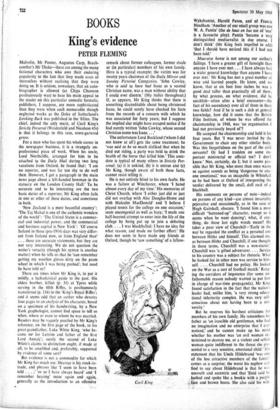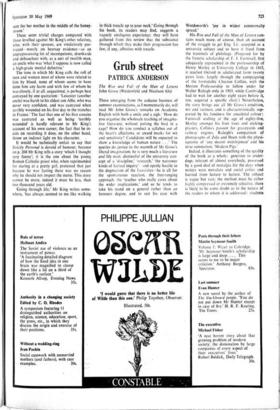• King's evidence BOOKS
PETER FLEMING
Malvolio, Mr Pooter, Augustus Carp, Beach- comber's Mr Thake—these are among the many fictional characters who owe their enduring ' popularity to the fact that they made asses of themselves without realising that they were doing so. It is seldom, nowadays, that an auto- biographer is allowed (as Chips Channon posthumously was) to base his main appeal to the reader on this particular comedic formula; publishers, I suppose, are more sophisticated than they were when such memorable though
neglected works as the Duke of Sutherland's Looking Back was published in the 'fifties. The chief, indeed the only merit, of Cecil King's Strictly Personal (Weidenfeld and Nicolson 45s) is that it belongs to this rare, cross-gartered genre.
For a man who has spent his whole career in the newspaper business, it is a strangely un- professional piece of work. When his uncle, Lord Northcliffe, arranged for him to be attached to the Daily Mail during two long vacations from Oxford, he found that: 'I am no reporter, and was far too shy to do well then. However, I got a paragraph in the main news page about a left-handed bowman in the statuary on the London County Hall.' To be accurate and to be interesting are the two basic duties of a reporter; Mr King often fails in one or other of these duties, and sometimes in both.
'New Zealand is a most beautiful country': 'The Taj Mahal is one of the authentic wonders of the world': 'The United States is a commer- cial and industrial power, and the commercial and business capital is New York': 'Of course Ireland in those (pre-1914) days was very differ- ent from Ireland now, or from England then' . . . these are accurate statements, but they are not very interesting. We do not question the writer's veracity (though his syntax is another matter) when he tells us that he 'can remember getting my woollen gloves dirty on the pram wheel in which I was being pushed'; but need he have told us?
There are times when Mr King is, to put it mildly, a lackadaisical guide to the past. His eldest brother, killed (p. 31) at Ypres while serving in the 60th Rifles, is posthumously transferred (p. 116) to the 'King's Royal Rifles'; and it seems odd that an author who devotes four pages to an analysis of his character, based on a specimen of his handwriting, by a New York graphologist, cannot find space to tell us when, where or even to whom he was married. Readers may be vaguely puzzled by Mr Icing's reference, on the first page of the book, to his great-grandfather, Luke White King, 'who be- came MP for Leitrim and father of the first Lord Annaly'; surely the second of Luke White's claims to distinction ought, if made at all, to be amplified and, preferably, supported by evidence of some sort?
But evidence is not a commodity for which Mr King has much use. Hearsay is h4 stock-in- trade, and phrases like 'I seem to have been told . . . ,"or so I have always heard' and 'I remember hearing' recur again and again, generally as the introduction to an offensive
remark about former colleagues, former rivals or (in particular) members of his own family. Here is a typical example; the victim was for twenty years chairman of the Daily Mirror and Sunday Pictorial Companies. 'John Cowley, who is said to have had Isaac as a second Christian name, was a man without ability that I could ever discern.' (My italics throughout.) If, as appears, Mr King thinks that there is something discreditable about being christened Isaac, he could surely have checked his facts from the records of a concern with which he was associated for forty years; but I suppose the implied slur might have escaped notice if he had merely written 'John Cowley, whose second Christian name was Isaac... .'
The unfortunate Lord Buckland (*ham I did not know at all') gets the same treatment; he 'was said to be so much disliked that when he died out riding, a party was held to drink the health of the horse that killed him.' This anec- dote is typical of many others in Strictly Per- sonal; (a) it is unkind, (b) it is untrue and (c) Mr King, though aware of both these facts, cannot resist telling it.
He is not entirely blind to his own faults. He was a failure at Winchester, where 'I hated almost every day of my time.' His memories of Christ Church, where 'I either just did or just did not overlap with Alec Douglas-Home and with Malcolm MacDonald' and 'I believe I played tennis for the college on one occasion,' seem uncongenial as well as hazy; 'I made one half-hearted 'attempt to enter into the life of the college by being put up to join a debating club. . I was blackballed; I have no idea for what reason, and made no further effort.' He does not seem to have 'bade any friends at Oxford, though he 'saw something' of a fellow- Cecil King 7
Wykehamist, Harold Paton, and of Fran, is Needham. 'Another of our small group was one W. A. Pantin' (the de haut en bas use of `one' is a favourite ploy). Pantin 'became a very distinguished mediaevalist in due course. I don't think' (Mr King feels impelled to add) 'that I should have noticed this if I had not been told.'
Maui aise honte is not among our author's failings. 'I have a greater gift of foresight than anyone I have ever met ... I have always had a wider general knowledge than anyone I have ever met.' Mr King has met a great number of wise and learned people. He knew, and we know, that at six foot four inches he was a good deal taller than practically all of them; by what process, on what evidence, did he establish—often after a brief encounter—the fact of his ascendancy over all of them in these two fields? And if he is such a dab at general knowledge, how did it come that the British Film Institute, of whom he was offered the chairmanship in 1948, was 'an organisation I had not previously beard of'?
He accepted the chairmanship and held it for four years. But 'I was never invited by the Government to chair any other similar body. Was this forgetfulness on the part of the civil servants? Or had I trodden on some im- portant ministerial or official toe? I don't know.' Nor, certainly, do I; but it seems pos- sible that Mr King, who more than once warns us against sounds as being 'dangerous to any- one emotional,' was as incapable in Whitehall as he had been at Oxford of interpreting the verdict delivered by the small, dull tock of a blackball.
His comments on persons of note—indeed on persons of any kind—are almost invariably pejorative and occasionally, as in the case of Hugh Gaitskell, obscure. 'I found him a most difficult "buttoned-up" character, except so it seems when he went dancing'; what, if any- thing, do those last eight words mean? He takes a poor view of Churchill—'Early in the war he regarded the conflict as a personal one between Hitler and himself. This alarmed me, as between Hitler and Churchill, if one thought in those terms, Churchill was a non-starter.'
Churchill was 'a gifted adventurer. . . . Service to his country was a subject for rhetoric. What be looked for in other men was service to him- self. . . . Churchill had no policy. He looked on the War as a sort of football match.' Rang- ing the corridors of impotence (for some un- fathomable reason nobody wanted to put him in charge of war-time propaganda), Mr King found satisfaction in the fact that the nation's leader had, unlike him, 'a very strong educa- tional inferiority complex. He was very self- conscious about not having been to a uni- versity.'
But he reserves his harshest criticisms for members of his own family. He remembers his father as 'an irascible old gentleman, who had no imagination and no enterprise that I ever noticed,' and he cannot make up his mind whether his mother was 'an evil woman de- termined to destroy me, or a violent and selfish woman quite indifferent to the threat she pre- sented to a very sensitive, emotional child.' His
stanement that his Uncle Hildebrand 'was one of the less attractive members of the family'
comes as a surprise; the worst his nephew can find to say about Hildebrand is that he was uncouth and eccentric and that 'Enid said he
looked and spoke like a bookie with a purple face and brown boots. She also said his wife sent for her mother in the middle of the honey- moon.'
These seem trivial charges compared with those levelled against Mr King's other relatives, who, with their spouses, are vindictively por- trayed—mostly on hearsay evidence—as an unprepbssessing lot of incompetents, drunkards and debauchees with, as a sort of twelfth man, an uncle who was 'what I suppose is now called a high-grade mental defective.'
The tone in which Mr King calls the roll of men and women most of whom were related to him by blood, none of whom seems to have done him any harm and with few of whom he was closely, if at all, acquainted, is perhaps best conveyed by one quotation : `Leicester (another uncle) was harsh to his eldest son Alfie, who was never very confident, and was castrated when terribly wounded on his first day in the trenches in France.' The fact that one of his first cousins was castrated as well as being 'terribly wounded' is hardly relevant to Mr King's account of his own career; the fact that he in- sists on recording it does, on the other hand, throw an indirect light on his character. • It would be technically unfair to say that Strictly Personal is devoid of humour, because on p. 208 Mr King tells a story 'which I thought very funny'; it is the one about the young Roman Catholic priest who, when reprimanded for staring at a pretty girl, protested that just because he was fasting there was no reason why he should not inspect the menu. This story cannot be more, indeed it must be less, than two thousand years old.
'Going through life,' Mr King writes some- where, 'has always seemed to me like walking in thick treacle up to your neck.' Going throngh his book, its readers may find, suggests a vaguely analogous experience; they will have gathered from this review that the substance through which they make their progression has few, if any, affinities with treacle.



































 Previous page
Previous page